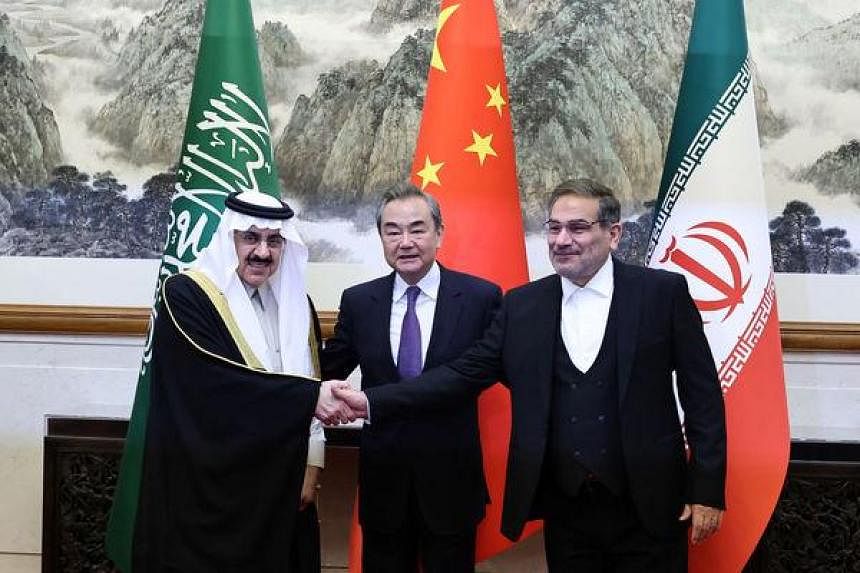BEIJING – China has said it is deeply concerned over Iran’s strike on Israel on April 13, but has stopped short of condemning the attack; instead, it described it as a “spillover of the conflict in Gaza”.
While a multitude of countries, including Japan, Denmark, Mexico and Singapore, have immediately censured the drone and missile strikes on Israeli territory – which Iran says is payback for an April 1 bombing of its consulate in Syria – Beijing has held back on criticising its important strategic partner.
The two countries have forged close economic and strategic ties in recent years, with China buying as much as 90 per cent of US-sanctioned Iranian crude oil in 2023 at discounted prices, making it Iran’s biggest trading partner.
In 2023, China also brokered a high-profile deal between Iran and Saudi Arabia to restore diplomatic ties after years of hostilities, as it continues to seek to expand its presence and influence in the Middle East.
In contrast, Beijing had earlier condemned Israel’s suspected strike on the Iranian consulate, and it also called on the United States to play a “constructive role” in resolving the Gaza conflict.
The lack of a denunciation by Beijing over the violence shows that it considers Tehran’s actions a legitimate response, said Mr Ahmed Aboudouh, an associate fellow at London-based think-tank Chatham House.
“However, overall, China is unlikely to take significant steps that may undermine its relations with either Iran or Israel as long as its commercial and political interests are not directly affected,” said Mr Ahmed, who is also head of China studies at the Emirates Policy Centre, a think-tank in Abu Dhabi in the United Arab Emirates.
“The only opportunity this escalation may create for Beijing is to blame the US’ mild pressure on Israel to stop the war in Gaza.”
Since the start of the Gaza crisis, China has advocated for the Palestinian cause, emphasising that a two-state solution is the only way to end the conflict between Israel and Palestine.
It has repeatedly called for a ceasefire, but has avoided condemning Hamas for its surprise Oct 7 attack on Israel.
“So far, the PRC has been publicly quite hands-off regarding the conflict in Gaza. They have issued statements calling for peace, criticising Israel and expressing support for Palestine. Action has been less evident,” said Associate Professor Chong Ja Ian from the National University of Singapore, referring to the People’s Republic of China by its abbreviation.
Similarly, Beijing has also been advocating for peace in Yemen – which has been besieged by a civil war for the past decade – but refrained from denouncing the country’s Iran-backed Houthi rebels for attacking commercial ships in the Red Sea since November.
“This relatively quiet approach reflects both the complicated situation facing Beijing and its limited leverage in the region,” said Prof Chong, an international relations specialist with a focus on Chinese foreign policy.
Even so, the US and other Western countries had urged China to use its sway with Iran to prevent a retaliatory attack and an escalation of tensions after Tehran vowed retribution for the consulate attack.
Mr Ahmed said: “I suspect the US already understands the limits of China’s leverage over Iran and the lack of desire in Beijing to support Washington’s strategic preferences towards the ongoing Iran-Israel conflict.
“I think by repeating that it continues to reach out to China to help curb Iran and its proxies’ actions, the Biden administration seeks to demonstrate it didn’t leave any stone unturned and draw what it considers China’s inaction and self-interested approach under the spotlight.”
He added: “The ultimate objective is to promote to the regional countries the narrative that Beijing is an unreliable partner and that the US is the only security principal that guarantees regional security.”
But Beijing is also likely not interested in direct involvement, said the University of Groningen’s Assistant Professor William Figueroa, whose research focuses on Sino-Iranian ties.
“While happy to play a role in negotiations, the reality is they lack real coercive power in the region and remain primarily interested in trade and diplomatic initiatives. They are aware of this and not eager to overextend themselves the way they believe the US has done,” he added.
China’s other considerations
Chinese supply chains and energy imports could be at stake if there was wider instability in the Middle East, putting further strain on the Chinese economy – a situation that Beijing would want to avoid, said Prof Chong.
“Beijing also wishes to maintain positive ties with the Arab states and Iran due to these considerations. As a result, it probably wants to avoid behaviour that could seem less supportive to these actors, including acts like publicly criticising or putting pressure on Tehran,” he added.
“How much Beijing can really restrain a partner like Iran is also unclear, especially on issues that Tehran deems important.”
Still, the continued instability is likely to reduce future Chinese investments in Iran and economic relations with the country, which are already constrained due to the US sanctions, said Prof Figueroa.
China has already advised Chinese companies and travellers to Iran to exercise caution, though it had been heavily promoting tourism to Iran until recently.
“This may further damage and limit the growth of ties between the two countries, although probably only temporarily,” added Prof Figueroa.
As a result, China is expected to stick to its risk-averse, balancing policy while dealing with Iran and Israel, said Mr Ahmed.
“This is aligned with Beijing’s concern that if the ‘spillover’ reaches the Gulf region, it may unravel the China-sponsored diplomatic thaw between Iran and Saudi Arabia,” he said.
Mr Ahmed was referring to the possibility of Israel targeting Iranian interests in the Hormuz Strait, a narrow but vital waterway between Iran and Oman that is the most important oil passage in the world, or a US strike from its military bases in the Gulf that could trigger an Iranian response.
“I suspect this is the biggest concern Chinese officials are considering right now.”


